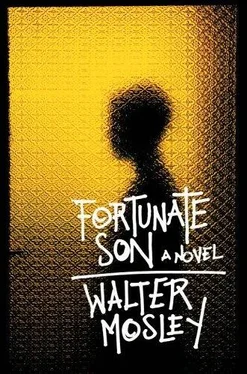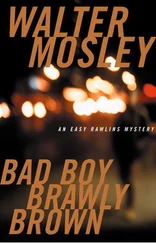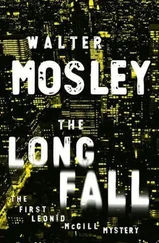Thomas dropped the dime into the slot.
“Tommy, are you still there?”
“Yes.”
“Listen, baby. Maybe you should call that family you used to live with. Maybe they could help you out. You know, I don’t have hardly enough to keep me goin’. Now I got somethin’ in my stomach and the doctors wanna cut me open. I can’t take care of you, baby.”
“I called Dr. Nolan a long time ago,” Thomas said. “They said not to call no more.”
“You must’a not understood’em, Tommy. ’Cause that boy Eric was writin’ you letters once every mont’ up until about four years ago. I must’a had a hundred letters and postcards from him in my dresser.”
“Do you still have’em?”
“No, baby. I did a spring cleanin’ just two weeks ago and threw them all away. I hadn’t heard from you in years. I didn’t know.”
Thomas spoke to his grandmother until all the change ran out. He asked her if she wanted to call him back, but she said that she was behind on her phone bill and they had blocked her making any outgoing calls except for 911.
Thomas lost all direction for a while then. He wandered the streets, talking to Alicia sometimes and other times to his mother. He daydreamed about all of those letters and what they might have said. Here in Hawaii, Tommy. The pineapples are really great, or, I just bought a new car and I’m driving to Frisco for the weekend.
Thomas tried to think about what his brother looked like now that he was nineteen. But all he could imagine was a bigger version of the blond-headed boy.
Maybe there were photographs in the letters. Maybe he needed Thomas to be there for something.
Thomas knew that he was the only person that Eric ever confided in. The bigger boy was too proud to admit fear to his father, and around Branwyn he always lost his tongue. Only with Thomas, when they were alone, did Eric say how he really felt.
“I don’t know why everybody thinks they like me so much,” Eric once said to his brother. They were five, sitting atop the stone elephant pretending they were in India delivering spice to the English.
“They don’t think they like you,” Thomas said. “They really do.”
“No. If they did they would ask me about what I liked instead of making me spell words and go to their houses. They never want you to come.”
Thomas remembered the pain that his brother felt for him, and he wondered if he was still the same or if he’d changed like other boys did when they became men. Thomas hadn’t changed. He was still the same, he knew. He got a little bigger, and he no longer had a clubhouse or a valley or a friend — but he was still the same.
Thinking this last thought, Thomas made up his mind to find his brother. He wouldn’t be afraid that Eric wouldn’t talk to him. He wouldn’t be quiet. And anyway, he had found something out that he knew the old Eric would like. And if Eric was the same, he would still like it.
Eric sat up until late in the night holding his daughter and thinking about Raela. Christie loved him and so did Mona. He had fallen into this life as he had into everything else. He never made decisions — he didn’t have to. Everything came to Eric.
Raela was his first real challenge — that’s how he saw it. If he became friends with the child, she would own him, and his family would be destroyed. He knew this. But it didn’t have to happen. All he had to do was commit himself to the life he was living. This commitment would save his girlfriend and daughter, and make him a part of the world. He would be like other people who had to deny themselves in order to survive.
At three in the morning he brought Mona inside and put her in her bed. Then he went to his bedroom and gently shook Christie by the shoulder.
She came awake with a start.
“What’s wrong? What?”
“I wanted to ask you something.”
“What?” she asked, the fear still deeply rooted in her voice.
“Do you still love me?”
She hesitated.
“Why are you waking me up in the middle of the night to ask me that?” she said. Then, noticing that he was dressed, “Haven’t you been to bed?”
“I’ve been awake,” he said, “thinking about you.”
“Me? What about me?”
“I want you to marry me.”
Christie gasped. “What?”
“Marry me. We’re already parents together. We need to work right together.”
Christie slapped Eric across the face hard enough to turn his head. When he turned back, she slapped him again.
“How dare you,” she said, seething.
“What? I thought you wanted this?”
“I do. I did. But I gave up. You were here, but not the way I wanted you. I loved you, and all you ever did was care in return. You never laughed out loud or ran to me or got mad and walked out. You never got jealous when men would stare. You weren’t even upset when you found Drew here sitting with me after you’d been gone for days.”
“You’re friends,” Eric said with a sheepish smile. “I didn’t think women liked men to be jealous.”
“But you shouldn’t take us for granted,” she said in a voice loud enough to fill a small auditorium.
“I do care. I love you. I want you to marry me.”
Christie was fully awake now. Her violet, reddened eyes were wide with something like rage. She was shaking, but when Eric reached out to calm her she pushed him away.
“What are you?” she said. “How dare you.”
“I don’t understand, Christie. I’m sorry.”
She would not cry. She would not.
She got up from the bed and dressed quickly in pants and a T-shirt, putting on no underwear.
“I’m going away for a while,” she told Eric, holding back the rage.
“When will you be back?” he asked.
“I don’t know.”
“Today?”
“I don’t know.”
“All right. If that’s what you have to do.”
“It is. I’m going,” she said, and she was out of the apartment in less than a minute.
Christie drove toward the desert, finally able to cry now that she was behind the wheel and sealed in her car. She turned the radio on and then off. She took out her cell phone, entered a number, then disconnected before the call engaged. She turned on the radio again, turned it off again. She put a CD into the player. It was an old collection, one she had bought for her mother, Mary McCaslin’s Way Out West. When the sweet, high voice began to sing her cowboy complaints, Christie calmed down enough to wend toward depression.
Drew wasn’t visiting from back East. He’d dropped out of school and come back to L.A. a year before. He called her when Eric wasn’t home and begged her to come back to him. Her departure from his life, it seemed, left a wound that would not heal.
She still liked Drew. She cared for him. But after months of his begging and after years of Eric’s cool detachment, she couldn’t take any more. So when Eric went away to keep from getting Mona sick (as if, she thought, his germs were deadlier than other people’s), Christie said okay when Drew wanted to come over. She said to herself that she merely wanted company, to have her own life. Maybe they would have dinner and talk about old times, she had thought. Her mother had wanted to spend time with Mona, and so Christie packed her an overnight bag.
Drew tried to kiss her at the front door, but she pushed him away and said that if he did that again he’d have to leave. She meant that. He apologized nicely, and they sat down on separate chairs in the living room in front of the window that looked out over Santa Monica.
They started out talking about his paintings. There was a gallery in San Jose interested in showing two canvases. They were paintings of Christie the way he remembered her when they’d gone to Catalina Island for the weekend once. They were nudes. He’d love to show them to her. To him she had always been the ideal of beauty. He loved her then and he still did. He dreamed about her; he told her he dated women who looked like her. He had dropped out of school to be near her.
Читать дальше












